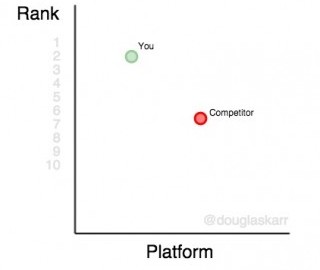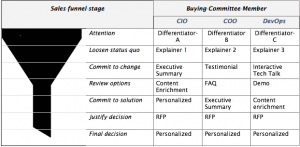The search engine industry grew to some amazing heights and erupted in a huge variety of keyword research, site analysis tools and rank monitoring platforms. We’ve tried and tested them all and have honestly been dissatisfied with the majority. Most of them have not kept up with significant algorithm changes and do a poor job of helping customers analyze their site’s authority, discover the keywords that drive conversions, and help them with developing content.
Case in point, we have a large publisher with millions of pages that we track over 400,000 keyword combinations for. Most of the platforms out there require that we hand-enter and categorize the keywords that we wish to track and then they show us linear reports of progress over time. Some even have some movement alerts to let us know when our rank is up and when it’s dropping.
As an industry, we’ve finally got the attention of corporate leadership to apply budget to strategies that generate leads from search engines. The problem is that those leaders are fairly ignorant of the complexities of search engines. Each week or month they just want to review a keyword ranking report – lest they understand the limitations of it. And the platforms aren’t assisting with these complexities, either.
Scenarios Missed by Keyword Ranking Reporting Platforms
I’d like to walk you through a series of where keyword ranking is leading us astray. Most of the keyword ranking platforms simply provide a keyword (and associated URL) with a rank position that is detected at a particular point in time from a particular location.
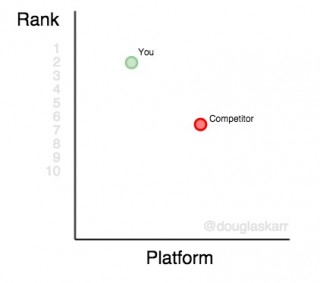
That’s fantastic… but there’s a problem immediately and that’s location. If you’re in Toronto you might see one result, if you’re in Vancouver the results might be different.
Location-based Keyword Reporting
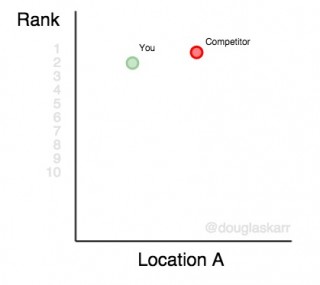
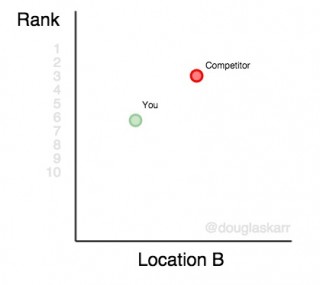
We’ve seen many of the platforms recently updating their tools to allow for location-based queries so this isn’t as complex as it once was. Personalized search poses a much more complex issue. If I am a marketing person and I’m consistently searching for and reading marketing material, there’s no means of me getting personalized overviews from these tools. It’s a technology challenge that I don’t think we’ll overcome anytime soon.
Personalized Search Keyword Results
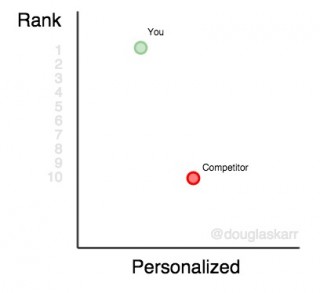
Another issue that we continuously run into are algorithm ripples. While ranking tools monitor an instance in time, we often see our clients’ ranking on some terms drop and lift (or vice versa) from the time of the algorithm change to a couple week period with no indicator of site or competitive changes. It’s why we don’t instantly react when an algorithm is rippling through… the search engine often makes adjustments and we watch many of our clients’ competitors panic and make dramatic changes when they see a steep drop. If they waited, they may have seen a full recovery… instead they let us overtake them. Relying on the keyword rankings alone can lead you astray.
Algorithm Keyword Ranking Ripples
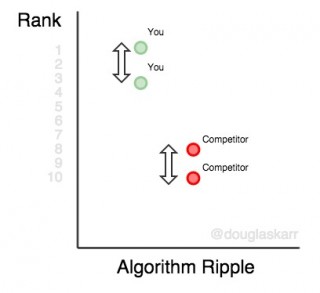
Another common thing we see is a competitor overtaking our client after they make the news. Perhaps they were acquired or invested in, so there’s a ton of news on some high authority sites. This results in a nice spike for them but over time, they gradually fall back to the place they had started. Ranking requires unrelenting momentum to attain and maintain your rankings.
Keyword Ranking Spikes
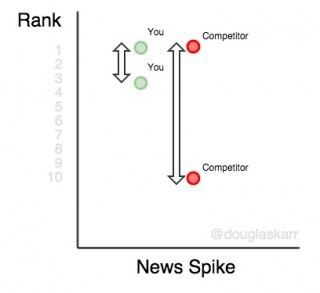
Perhaps one of the biggest issues we find with keyword ranking platforms is that they don’t provide us with other keyword combinations that we are ranking on or losing on that are competitive in nature. If we don’t hand enter the keyword, we don’t know if it exists. We do have some discovery tools we use for this, but the platforms don’t provide that integration and really should. Imagine if you were just tracking “mobile phone” and not “smartphone” as the related term overtook the market.
Related Keyword Tracking and Discovery
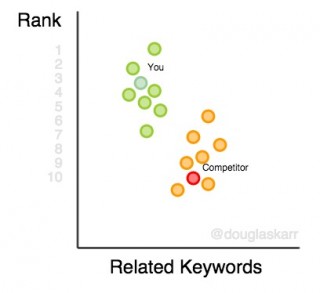
What we believe the search engines to be doing is building central authority on specific branded, geographic and topical terms for our clients. There may be hundreds of distinct keywords associated with central topic, the question is whether or not our client is building authority across an aggregate term – not just independent keyword combinations that are constantly moving up and down. Goring through and categorizing hundreds or thousands of keyword combinations isn’t the answer, it’s too resource intensive.
Aggregate Keyword Tracking
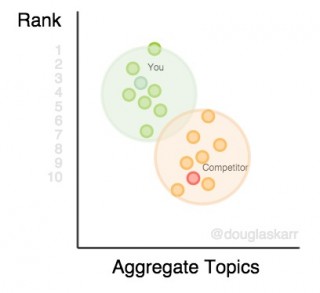
As well, we need to look at our pages, not simply the keywords. Some of our clients rank on over 20 different keyword combinations, many of them on a wide range of topics, for a given page. We need to be able to look at how the different page templates, article types and formats are driving search and conversion results. We need to also understand how the site and content hierarchy and internal linking are impacting the emphasis we’re displaying our content to the search engines with.
Aggregate URL Tracking
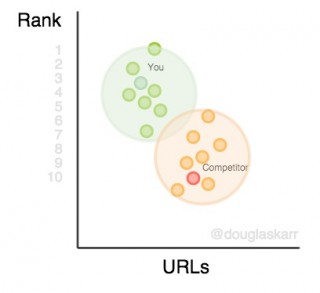
Lastly, a key issue that we’ve discovered is that our clients’ authority is built across three kinds of keywords – brand, topic and geographic. If we are grouping our keyword into categories where we’re including branded keywords, we’re not truly monitoring whether or not we’re building authority on a certain topic. A unique company or product name is always going to have us ranking on top. We need to omit any rankings from our reports for those branded terms to see if we’re making headway.
Brand, Topic and Geographic Keywords

Now, take all of the examples I’ve provided above and remember that there are search trends, competitive changes, algorithm changes, new content, news spikes… all happening simultaneously and ongoing. We’re not just ranking keywords – it’s a living, breathing ocean of change that we’re trying to get a grasp on.
The dream system is one that provides for keyword discovery, keyword recommendations, aggregate tracking using regular expressions, conversion tracking integration, and other factor analysis like social media shares, page mediums and layouts, etc. That would allow us to mine our data from a broad topic down to a specific geography and measure combinations that drive conversion traffic as well as discover new combinations that might help.
We were fed up with the keyword ranking tools out there and decided, for this client, the only choice was to build ours from the ground up using APIs from keyword monitoring services, keyword discovery services, and analytics integration. It’s quite the undertaking but we’re making headway. I’ll keep you posted.
Post from: Search Engine People SEO Blog
How Keyword Ranking Reporting Is Leading You Astray
—
Written by Douglas Karr, Marketing Technology Blog
The post How Keyword Ranking Reporting Is Leading You Astray appeared first on Search Engine People Blog.
(362)
